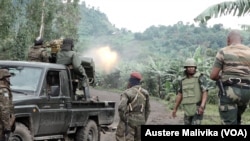Recent clashes by the March 23 Movement known as the M23 rebels have led to heightened tensions between Kinshasa and Kigali.
The latter is being accused of supporting M23 rebels. Kigali has vehemently denied any involvement even as U.N experts back the Congolese allegations with ‘’solid evidence.’’
Nicolas Delaunay, East and Southern Africa project director at the International Crisis Group told VOA from Nairobi that the modus operandi of the M23 rebels today mirrors its activities that led to the takeover of Goma in 2012.
‘’What we’ve seen over the past weeks is that the M23 (rebels) are getting very close to Goma. And obviously this brings back a lot of memories in eastern DRC where in 2012, M23 rebels took control of Goma for several days.’’
‘’At the time, the Congolese army exited Goma, and the town fell into the hands of the M23 (rebels),’’ he recalled.
He said ‘’Our understanding is that the group is a few dozen kilometers from Goma, and ‘’if the M23 (rebels) were allowed to take Goma, it would have disastrous consequences.’’
On Wednesday, the former Kenyan president called for urgent intervention in the Democratic Republic of Congo where fighting between the Congolese army and M23 rebels have forced hundreds out of their homes.
Kenyatta visited Goma in the DRC’s eastern province on Tuesday to try to quell tensions between both nations.
He was said to have seen hundreds of locals sleeping rough by roadsides after their displacements following last week’s attack launched by the rebels.
The ICG analyst warned of dire consequences if stakeholders allow a repeat of an M23 takeover but reckoned that Kenyatta has the experience to bring the leaders to the negotiating table.
‘’The bad blood between Kigali and Kinshasa could become rare, including deaths. This would cause a complete collapse of relations between both neighbors,’’ Delaunay said.
‘’What (Uhuru) Kenyatta can achieve is to create some space for (Félix) Tshisekedi and (Paul) Kagame to dialogue at some point, and to deescalate to ensure that Goma does not fall to the M23.’’
He believes that ‘’Kenya comes with diplomatic and political capital and could potentially use that to bridge some of the divide between the two countries (referring to DR Congo and Rwanda).’’
David Otto Endeley, director at Geneva-based Center for African Security and Strategic Studies told VOA that the reemergence of the M23 rebels in eastern DRC has become ‘’a thorn in the flesh of the sub-region.’’
‘’The M23 rebels have caused enormous displacements in villages they’ve occupied. This has led to people living in fear, and in desperate situations. The humanitarian situation there is rising,’' he said.
‘’What (Uhuru Kenyatta) is seeking to do is to ensure that both leaders (Félix Tshisekedi and Paul Kagame) can come to some sort of understanding (so) that these issues can be resolved. He can succeed or not, but it also depends on the leaders.’’
The analyst said distrust between both camps could prove a challenge to Kenyatta's mediatory efforts.
‘’There’s a huge trust deficit that exist between DR Congo and Rwanda, because both sides are accusing each other of sponsoring rebel groups,'' he said noting ''the lack of capacity by governments to carry out demobilization process and reintegration of ex-rebels who agree to disarm.''
He added that ‘’The lack of a structure, resources to provide an exit route for these rebel groups provide a challenge, including accusations that each party is interested in exploiting mineral resources. These are some big issues likely to confront Uhuru (Kenyatta) as he steps in.''









